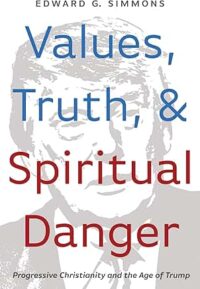Title: Values, Truth, and Spiritual Danger: Progressive Christianity and the Age of Trump
Author: Edward G. Simmons
Publisher: Wipf and Stock
ISBN: 1666708860
Pages: 284
Genre: Non-Fiction
Reviewer: David Allen
Hollywood Book Reviews
Historian and religious scholar Edward G. Simmons gives readers a rare treat: a truly scholarly work that is energetic, reader-tuned, and amazingly contemporary. ‘Contemporary’ is an understatement. Simmons’ book looks at the ascendency of Trump as a life and death challenge to the spiritual mission of our era.
A key explanatory concept for Simmons is cognitive dissonance, stress – and disease-making societal conditions where people believe one thing but do another. This remarkable writer and educator’s passion for making things better, for bringing seemingly disparate points of view together, is both admirable. and masterful. And it is evident on every page. The book’s five sections address what in Simmon’s view are the most salient and relevant points in both Scripture and in current events.
Consider, for example, Genesis and the story of the Garden of Eden. Did the Creation literally happen, or is there greater significance and utility to the tale? For Simmons and for Progressive Christianity, the two possibilities do not cancel one another out. They can be complementary. When history (including religious history) is culled as myth and metaphor, wonderful things begin to happen. Patriarchal religions like Judaism and Christianity begin to take on a more humanistic, less tyrannical, more inclusive aspect. Your neighbor may not be your co-religionist, but he is not your enemy.
The Book of Exodus offers another terrific springboard for take home lessons for humanity, especially given the intense focus in recent years on genocide, oppressed minorities, mass migration, and colonialism. Simmons finds enormous relevance in the Gospels to today’s moral issues as well. The key here is open-mindedness, inclusivity, always with a view toward furthering the discussion.
Simmon’s core identity as historian shines bright in each of these linked essays. Readers can treat themselves to a swift and canny understanding of events like the Sermon on the Mount, where Jesus linked his teachings to those of Moses. Subsequent people and events, including Martin Luther, John Calvin, and the Protestant Reformation, under Simmon’s able hand are easily grasped as a set of necessary and sufficient historical transitions leading up to and explaining the present.
Simmonds is an articulate champion of theologian Reinhold Niebuhr. The last section of the book, Revelation – Warning and Hope, is my favorite. In it, the author waxes synthetic, ultra-humanistic and frighteningly prescient. (Never pedantic.) Check out chapter titles like ‘Living Through A Lawless Apocalypse’ and ‘Narcissistic Prayer \verses the Lord’s Prayer.’ His mission, successfully achieved here, is to argue for and then reconcile seemingly disparate points of view. Humanistic synthesis, compassionate synthesis, fortified by solid historical understanding and scholarship, is where Edward G. Simmons is at.
Values, Truth, and Spiritual Danger challenges readers to reflect deeply on their own religious beliefs with contemporary societal issues, urging a return to a faith rooted in action, inclusivity, and a commitment to truth. A must-read for believers and skeptics alike seeking clarity in an age of confusion.

